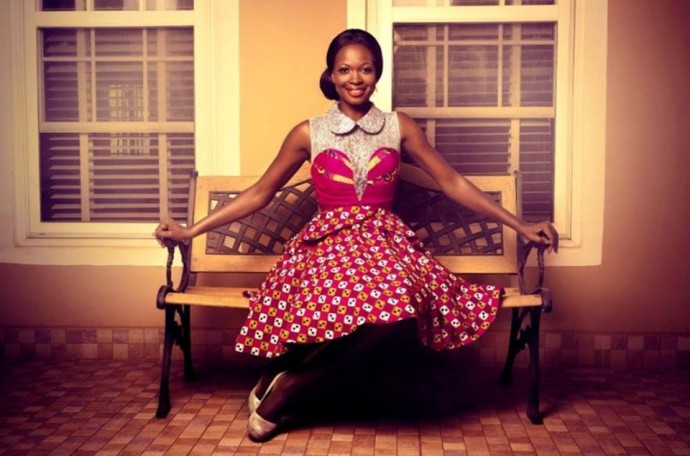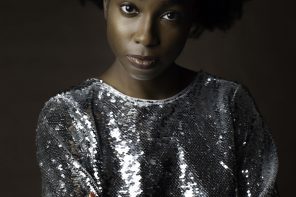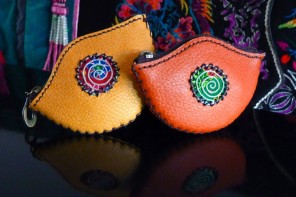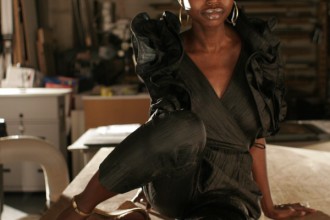The streets of Accra are adorned with storefronts. Huddled in old shipping containers turned mini store spaces, these shops are run by small commercial business owners. From the small produce seller to hairdressers and even tailors and seamstresses, selling their homemade creations and more. They are worth venturing into to discover treasures of genuine creativity within their metallic walls. Situated in East Lagon (North-East of the city), is one of these storefronts worth venturing into. It’s called PISTIS. At first it seems like a classic fashion store but little do most know that its doors lead to one of the most promising, up and rising fashion houses in all of Ghana.
The space is unique as it’s not a shipping container like many of the other clothing shops but rather is an actual built-in boutique. Walking into the chic store, one is met with a few select items on display but each dress, shoe, bag and piece of jewellery is stunning. Each piece unique and hung up in the only size it was made in. Ghanaians are big on unique clothing items. What one wears, one does not expect or want to see any other person in the whole city wearing. The founders of PISTIS SUMAIYA and KABUTEY DZIETROR are very aware of this and spend time to make sure that no piece of cloth is used twice.
You can also discover the story of Loza Maleombho, a designer based in Côte d’Ivoire
I sit with them in the gown fitting space in their house behind the store itself. Kabutey has a soothing quiet confidence about him, while Sumaiya is energetic and straight forward – a complementary duo. Their brand PISTIS has made its way into the hearts of Ghanaians in the country and abroad because of an exquisite attention to detail in creating gowns for many occasions as well as dresses, skirts and some cool menswear.
CHOOSING AN ORIGINAL PATH
PISTIS means the personification of good faith in Greek – Kabutey tells me. They both needed a lot of faith to start this brand. Even though they met in fashion school, it was one of the rare one-year fashion programmes in Accra. Fashion was not exactly the vocation parents wanted their kids to follow: “ There were barely any fashion schools, we had to really believe in our dream and work on it because there wasn’t much support for people who wanted to be in fashion,” Sumaiya added. Indeed, despite having countless number of clothing factories 20 years back, Ghana lost its zeal for the fashion industry. Somewhere along the way everyone started wanting to be a doctor or a lawyer but these two stuck with what they loved, which was initially art and design that eventually turned into fashion. Samaiya always knew she was going to be a dressmaker: “ My friends would let me draw their dresses when they wanted to get something sown. As everyone started to pick what they wanted to do at school, I really thought about it and it was clear that fashion was it.” Kabutey on the other hand loved art and design, the fashion aspect came a bit later. They met at the one outstanding fashion school in Accra at the time: the Vogue Style School of Fashion and Design which is now the Joyce Ababio College of Design. This is where they realised they were good at conceptualising and creating together.
 FINDING COMMON GROUNDS TO EXPANSION
FINDING COMMON GROUNDS TO EXPANSION
It all began with a dress designed for Kabutey’s sister, which became a hit among her friends. From there, they got orders thanks to word of mouth but it took five good years for them to feel like they were really onto something. They intensified their work together and today cater to the modern Ghanaian woman: “We often think of how we can create a Zara inspired look in print wear or with tribal designs. It’s really about blending and finding a compromise that fits our culture,” says Sumaiya. “The truth is, we target our people. We are Ghanaians and we work for Ghanaians; to their shape, style, body types, because that is our niche,” she adds. The brand creates outfits for Miss Malaika Ghana (a beauty competition) and is partnered with Ghanaian event group Charter House to provide outfits for events. They believe in starting and making it big at home in Ghana before even thinking of going elsewhere. Their house hosts an actual production factory with about 45 workers, everything is made there and only some materials are sourced externally. “We believe that you don’t have to look far, everything we need is right here in Ghana. Our people are quite laidback but once they are inspired, things get going. Ultimately we want to tackle our own fashion market first, and then expand into other African countries. When PISTIS is big, just as the Guccis and Valentinos are known to be from Italy, we want people to think and say Ghana when they hear PISTIS,” Sumaiya says brightly.
BECOMING INDUSTRY LEADERS
In Ghana, Kabutey and Sumaiya feel like there is a lack of example-setters for the youth, at least in the fashion industry. People often think this type of work is mainly for uneducated people but Kabutey makes a good point: “For the average student who is doing well at school, it is unthinkable that they would turn around and become a fashion designer because they have not seen the success and prestige that can come with it. However, if one day they can walk into a nice boutique with their Mom or Dad and see that the people who make the clothes are educated and talented, that could change their mind and inspire them to pursue a fashion career. If all they see are struggling seamstresses and tailors in container stores, then the job doesn’t seem attractive.” Samaiya adds: “Education is essential for this job. We didn’t get the full benefits of it. I made many mistakes making my first clothing items but today there are even 4-year university fashion programs in Ghana. Even though people are rushing into the industry thinking it’s easy, only those with real determination and perseverance will succeed.”
Also read: What if African fashion makes money?
Kabutey and Samaiya recognize the value of education and advocate that studying fashion should not be a second choice in school but a first for anyone who is passionate. They make it look easy but they have put in a lot of work since2007 and the next years to come looks very promising. They envision a head office in Accra offering a whole range of fashion products. We have faith in them.






Hi,
My name is Jumi, I love your website, the content resonates. I am passionately African, a writer and a lawyer. I am the resident writer at jumokeodepe.blogspot.com where my body of work reflects my concerns over the African image especially since I moved to the West, it reflects initiatives we as Africans need to start embarking on to reproject our Continent. I will like to connect with you as well as share my thoughts on your platform. Please let me know how this works/can work.
Kind regards
Jumi